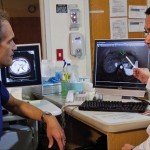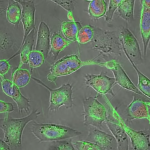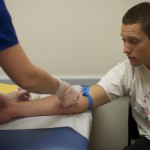Tag Cancer
UW-Madison scientists find how many cancers may evade treatment
Xiaojun Tan, a graduate student in Richard A. Anderson’s lab at the University of Wisconsin–Madison, made an unexpected observation while studying the locations inside cells where the epidermal growth factor receptor, EGFR, can be found. His subsequent investigation revealed how cancer was evading treatment drugs: by sneaking through the cellular back door.
Company developing radio frequency technology to localize breast tumors
Breast cancer may inspire more public discussion, advocacy and charitable giving than almost any other disease besides HIV and AIDS. But people rarely talk about the specific experiences to which cancer patients are subjected.
Faster, safer method zaps tumors with great success
When Kevin McSweeney was referred to UW Health last year for a tumor in his liver, he had already gone through six rounds of chemotherapy and 13 surgeries over ten years to treat his metastasized cancer.
New tumor-targeting agent images and treats variety of cancers
Scientists at the University of Wisconsin Carbone Cancer Center (UWCCC) report that a new class of tumor-targeting agents can seek out and find dozens of solid tumors, even illuminating brain cancer stem cells that resist current treatments.
Dane County African-Americans have high cancer rates
African Americans in Dane County were 30 percent more likely than whites to be diagnosed with cancer.
UW’s Relay for Life on April 11 will help fight cancer
Participating in a Relay For Life event, like the one set for UW–Madison on April 11, is a way to take action and help finish the fight against cancer.
Junior Cal Melberg becomes ‘the match’
After attending a Be the Match bone marrow donor registration event on campus last May, UW–Madison junior Cal Melberg knew his chances of ever being matched were slim. Then, in September, he got the call.
UW researchers link protein with breast cancer’s spread to the brain
A cancer-research team at the University of Wisconsin–Madison has identified a protein that may be a major culprit when breast cancer metastasizes to the brain.
UW researchers witness new type of cell division, use it to battle cancer
While on their way to finding a means to attack certain types of cancers, the researchers made the first observations of cytofission in humans, a type of cell division that occurs at a different time than normal division.
UW Carbone Cancer Rearchers Named to Pediatric Cancer Dream Team
Dr. Paul Sondel Madison, Wisconsin — A “dream team” of pediatric cancer researchers at the UW Carbone Cancer Center is among scientists at seven…
Analytical trick may accelerate cancer diagnosis
Researchers at the University of Wisconsin–Madison have found a new way to accelerate a workhorse instrument that identifies proteins. The high-speed technique could help diagnose cancer sooner and point to new drugs for treating a wide range of conditions.
Science + art exhibit focuses on the beauty of a cure
An unusual exhibit focusing on cancer recovery through the lens of art and science will open Feb. 22 in the Biochemistry Department on the University of Wisconsin–Madison campus.
Strike against cancer at Bowlin’ for Colons
Bowlers from across Wisconsin plan to “pin” colorectal cancer by participating in the twelfth annual Bowlin’ for Colons fundraiser on Sunday, March 3.
New form of cell division found
Researchers at the University of Wisconsin Carbone Cancer Center have discovered a new form of cell division in human cells.
Scientists create road map to metabolic reprogramming for aging
In efforts to understand what influences life span, cancer and aging, scientists are building road maps to navigate and learn about cells at the molecular level.






